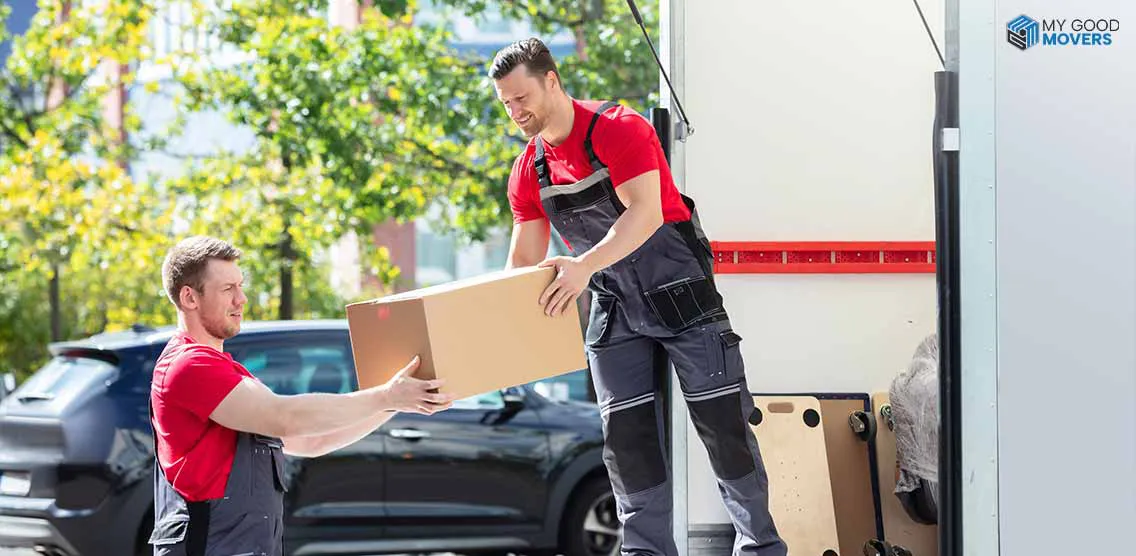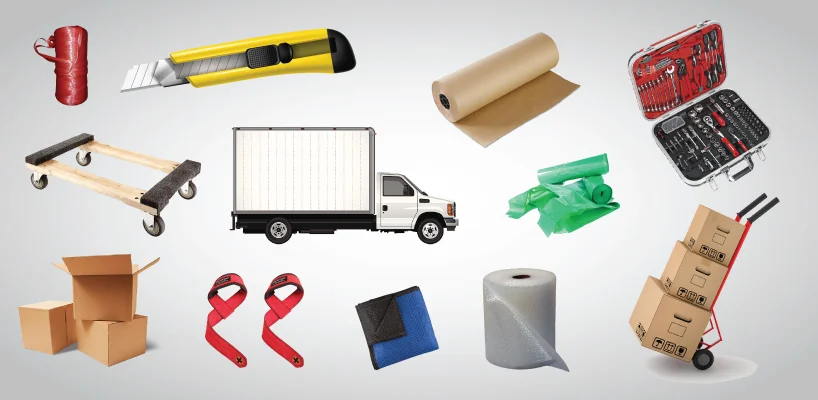Moving these days is like ordering takeout—you think you’re just paying for the meal, but by the time you check out, there’s a delivery fee, service charge, and tip you didn’t plan for.
That’s exactly what moving in 2025 feels like.
You might budget for the moving truck or the movers themselves, but what about the packing tape, temporary storage, or the $150 bill just to transfer your internet service?
Hidden moving costs are everywhere, catching people off guard in ways that didn’t hit as hard just a few years ago.
Fuel prices are rising again, with diesel averaging $4.15 per gallon in early 2025. This directly affects moving companies, which pass those fuel surcharges onto customers, especially for long-distance moves.
Meanwhile, labor shortages have pushed the average hourly rate for movers up to $65–$75 from $50 just a few years ago.
Trying to save money with a DIY move can backfire, too.
Between mileage overage fees, rental add-ons, and last-minute supplies, many people spend more than they would have if they had hired help.
To avoid financial surprises, you’ll need to plan for costs that don’t always appear on your first quote.
Let’s discuss where those expenses tend to creep in and prepare for them in advance.
Why 2025 is the Year of Hidden Moving Costs
In 2025, unexpected relocation expenses can catch you off guard, from higher labor rates to increased costs for essential services like utility setup.
Hidden moving costs in 2025 are creeping in from all sides, and most people don’t even realize it until it’s too late.
The Impact of Fuel Prices: Diesel hit $4.15 per gallon in early 2025, and movers are adding fuel surcharges to your bill.
Higher Labor Rates: Fewer movers mean higher wages—average rates are now $65–$75 per hour, up nearly 30% from a few years ago.
Demand is Driving Up Prices: Post-pandemic moves are creating peak season premiums, even outside summer.
DIY Moves Are Backfiring: Rental truck fees, mileage overages, and last-minute supplies often cost more than hiring professionals.
Pet Relocation Has a Price Tag: Moving with pets has become more expensive, with costs running into the hundreds or thousands for health certificates, flights, and more.
Reasons Behind Unexpected Expenses
These are some of the key reasons behind these unexpected expenses.
Packing Supplies
Packing supplies costs for relocation can quickly escalate, especially if you need specialty items like wardrobe boxes or bubble wrap
The average cost for packing materials for a typical home move can range from $100 to $200, depending on the size and number of items.
Also, specialty packing materials, like wardrobe boxes or dish packs, can cost even more.
Some movers charge extra for materials, so it's important to budget for this upfront. Costs can add up fast, so be prepared!
Quick Solution: Buy packing supplies in bulk from warehouse stores or check online marketplaces for free boxes. Ask your mover if they offer bundled packing materials at a discount.

Trying to cut down packing costs? Learn clever ways to save on materials with these best packing hacks for moving.
Utility Setup Fees
Utility setup fees are one of those unexpected relocation expenses in 2025 that many people forget to factor in when budgeting for a move.
Whether it’s gas, water, electricity, or even internet service, there’s often a setup fee attached to getting things up and running in your new home.
These fees can range from $50 to $150, depending on the provider and location. Sometimes, additional charges are made for expedited service or special installations.
It’s also important to be aware of deposits that may be required, especially if you’re moving to a new area or your credit history is being reviewed.
Quick Solution: Call utility providers at least two weeks in advance to get a quote. Ask about any setup fees, deposits, or discounts for early activation.
Why You Can Trust My Good Movers
550+
moving companies
listed
16,000+
customer reviews to help you decide
50+
states covered for moving services
100%
free quotes provided instantly
Temporary Storage Needs
When moving in 2025, temporary storage is more than just a convenience; it’s often necessary.
Whether you need a place to store your things while your new home is being prepped or if your moving dates don’t align perfectly, temporary storage costs can quickly add up.
These fees are one of those hidden moving costs that many people overlook until it's too late.
Storage unit prices vary significantly based on location, size, and demand.
For example, a standard 10x10 unit might cost between $100 and $300 monthly in larger cities or during peak moving seasons.
Quick Solution: Compare storage unit prices in advance and ask moving companies if they offer free short-term storage with their packages.

Need a place to stash your stuff mid-move? Here’s how to find cheap storage units without blowing your moving budget.
Insurance
Moving insurance and liability coverage is essential to protect your belongings, particularly for long-distance moves where the risk of damage increases.
While it's tempting to skip insurance to save a few bucks, it’s one of those hidden moving costs that could save you from a major financial headache.
In the chaos of moving, things can get broken, lost, or damaged—a cracked TV screen or a scratched sofa. Without proper insurance, you might be left to cover those costs yourself.
Basic coverage is often included in the price of your move, but it's typically minimal and may not cover everything you own.
Depending on your moving company and the value of your items, you could pay an additional $100 to $300 for this peace of mind.
Quick Solution: Check your homeowner's or renter’s insurance policy to see what’s already covered. Then, ask your moving company about supplemental insurance options.

Don’t skip insurance when moving. Learn more about getting health insurance after moving to ensure you're covered all around.
Fuel and Toll Fees
Fuel prices are one of the sneakiest hidden moving costs in 2025, especially when moving a long distance. Moving companies often charge extra for fuel, which can add up quickly.
Even if you’ve received a solid estimate from your movers, remember that if fuel prices spike, you might see an unexpected surcharge.
Diesel prices hovered around $4.15 per gallon in early 2025, a significant increase from previous years.
Tolls are another factor to consider in addition to fuel. If your route includes toll roads, you might be charged additional fees that aren't always included in the original quote.
Quick Solution: Before booking, request a detailed breakdown of your mover's fuel surcharge and toll policy. If you're renting a truck, use a toll calculator app to plan your route.
Pet Relocation
Pet relocation in 2025 comes with more red tape and higher costs than ever.
Whether moving across the country or internationally, you must arrange transportation, vaccinations, and sometimes quarantine fees.
For example, a cross-country pet transport service can cost between $300 and $1,000, depending on the size of your pet and the distance traveled.
In addition, you may need to book a special flight for your pet or pay an in-cabin pet fee, which can add up to several hundred dollars.
Quick Solution: Compare pet relocation services ahead of time and check airline pet policies. Book early to avoid peak pricing and ensure your pet’s documents are ready.

Planning a move with your pet? Check out these essential tips for moving with pets to ensure a smooth journey for your furry friend.
Professional Cleaning
Cleaning and junk removal fees can be overlooked when moving, but they're a common expense that adds up when you're preparing to move out of a rental.
The cost of professional cleaning depends on the size of your home, but on average, expect to pay anywhere from $100 to $300. The price could rise even more for a deeper cleaning, including carpet cleaning or appliance sanitizing.
These costs can sneak up on you, so factoring them into your overall moving expenses is important.
Quick Solution: Get quotes from 2–3 cleaning companies before moving day, or ask your property manager if they have preferred vendors offering discounts.
Lost Wages and Time Off
When moving, it’s easy to forget the cost of your own time.
Taking time off work to handle the logistics of moving can be a hidden cost of the relocation process. Many people miss a few days or more, which can mean lost wages.
In 2025, the average cost of missed work due to moving can increase quickly. For example, if you take two days off work and your daily wage is $150, your moving expenses will increase by $300.
If you’re managing a DIY move, the time commitment can be even higher, which means more days away from your job.
Quick Solution: Try scheduling your move over a weekend or holiday (if you get paid time off) and plan key moving tasks around your work hours to minimize missed days.
DIY Moves
While a DIY move might seem like a cost-saving option, it's important to account for DIY move hidden fees, such as rental charges, fuel costs, and even insurance.
From the cost of renting a truck to additional charges for mileage, fuel, and even insurance, a DIY move can quickly add up.
Rental trucks can cost between $30 and $100 per day, depending on the size and distance of your move.
In addition, you’ll likely need to buy packing materials like boxes, tape, and bubble wrap, which can cost an additional $100–$200.
Don’t forget the fuel cost for the rental truck, which could be anywhere from $50 to $200, depending on the distance you’re traveling.
Plus, if something goes wrong—like an accident or damage to the truck you may be responsible for paying for repairs.
Quick Solution: List every DIY cost upfront—rental, fuel, packing supplies—and compare with professional mover quotes. Sometimes, hiring helps save more in the end.
The Average Cost of Moving in 2025
It is compulsory to understand the average cost of moving in 2025 to budget for your move and avoid unexpected relocation expenses.
The total cost will depend on your distance, the size of your home, and whether you hire professional movers or opt for a DIY approach.
On average, a local move in 2025 will cost between $800 and $2,000, while long-distance moves could cost anywhere from $2,500 to $5,000 or more.
However, these estimates often don’t include hidden moving costs like packing supplies, insurance, or fuel surcharges.
Your moving budget can increase significantly when you factor in these additional costs.
Smart Tips for Managing Hidden Costs
To ensure you're prepared for any unexpected Hidden Moving Costs in 2025, here are a few essential tips that can help you stay on top of your budget and avoid surprises.
| Tip | Details |
|---|---|
| Get a Detailed Quote | Ask for a full quote, including potential add-ons. |
| Start Early | Research and compare moving companies to avoid surprises. |
| DIY When Possible | Handle tasks like packing to save, but watch out for hidden fees. |
| Emergency Budget | Set aside extra funds for unexpected costs. |
| Check for Discounts | Look for special offers or promotions that could reduce costs. |
| Be Mindful of Time | For better rates, avoid moving during peak times, like weekends or holidays. |
| Inventory Your Belongings | List your items to avoid extra charges for unlisted or oversized items. |
Recommended Resources















































 (239) 799–6077
(239) 799–6077